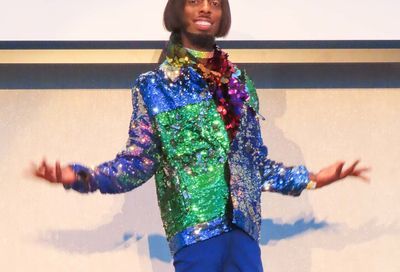High Notes
Malcolm Gets and John Glover rule the stage in Traviata, while Reasons is a provocative, troubling look at cruelty
It seems that, for as long as there have been people, there have been individuals trying to map dividing lines. To determine the boundaries between towns, countries and personal plots of land. Cartographers have circled the globe with clean, simple lines that allow us to plot latitude and longitude. We can navigate the globe with measurements that are defined and distinct. But for all our technology there are some limits that elude absolutes. Lines that we cross without knowing, territories we exit without understanding we will never be able to return.

The Lisbon Traviata
(Photo by Carol Rosegg)
Terrence McNally‘s The Lisbon Traviata is a play about some of the most elusive of these dividing lines. Currently joining its sister productions – Golden Age and Master Class – as part of the Kennedy Center‘s ”Terrence McNally’s Nights at the Opera,” Traviata asks us to watch as love, passion, hate and abandon demonstrate their soft-bounded divisions.
Stephen (Malcolm Gets) and Mike (Manu Narayan) have been together for eight years. While spending the evening with his best friend and fellow opera fanatic Mendy (John Glover), Stephen slowly brings to light the fact that he and Mike have decided to experiment with an open relationship. To Stephen it’s an uneasy phase, something he must do to keep Mike, even as he watches the life they once shared growing dimmer in the distance.
There are two very distinct movements to Traviata. We spend most of the first act in the flamboyant Mendy’s clubby, tailored apartment. Opera albums fill floor-to-ceiling bookshelves and the pace is moved sharply along by Mendy and Stephen’s brisk, opera-insider banter. The pair speak in divas and librettos and the affection they share with one another is transformative and comforting.
In the second act that tenor shifts slowly, with the rising action of a highly disciplined crescendo, as we move to the apartment Stephen and Mike share. Where the warmth is replaced by a bitter, brittle tension, where the welcome of home has been replaced by something disquieting and dark.
Embracing the tempest and transforming it – with all its violence and tearing emotion – into a seamless, masterful performance is Gets. When his character is at his worst, Gets inspires understanding and sympathy. When he is at his very best, Gets moves every heart in the audience to break. It’s a gripping performance to experience and a near impossible bit of acting to forget.




To April 11
Eisenhower Theater
$25-$65
202-467-4600
kennedy-center.org
If this were Shakespeare, Glover would be the fool to Gets’s King. Funny and outrageous yet, ultimately, the character that best understands the dangerous games being played around him, Glover’s Mendy is beautifully rendered. He is, without question, pushing the boundaries but manages to do so without leaving the realm of reality. He is extravagant though not unrecognizable. A clown, but most certainly not a cartoon.
Gets and Glover are joined by Narayan and Chris Hartl as Paul. (Not wishing to give anything away, it should be noted that Hartl’s Act 2 entrance drew a gasp from the Kennedy Center’s generally unflappable audience.) Both are fine actors, but neither seem entirely comfortable in the skins they’re being asked to occupy. Hartl, in particular, is shaky in his transitions – moving uncertainly from emotion to emotion.
From Narayan there is a desire to feel there is something more behind his actions, some flash of a fire greater with greater heat and impulse.
Without question though, Gets and Glover are the prima donnas in Kennedy Center’s Traviata. They’re the divas with whom we are meant to fall in love. And, in this production, we most certainly do.
In the Greek myth of Pandora a woman opens a box she is told not to open and unleashes a multitude of sins upon the world. A flood of anger, hate and violence set loose with a simple flick of the wrist.
—
In Neil LaBute’s Reasons to Be Pretty, now at Studio Theatre, a similar storm is released, not from the depths of a mysterious box, but from the utterance of a s ingle word — a word the speaker barely realizes he has said before it has flown beyond his control, poised to disrupt and destroy.
Greg (Ryan Artzberger) is the kind of guy who doesn’t spend a good deal of time thinking about his life. It simply is what it is. He has a decent job in a warehouse. He has an apartment and a girlfriend and a best friend and a spot on the company softball team.
And then, banging around under the hood of a car with Kent (Thom Miller) — the previously mentioned best friend — he makes a sta tement he will quickly learn to regret.
Actually, to call what he has said a statement might be giving it too much weight in the world beyond the stagecraft LaBute has set into motion.
Greg makes a remark about his girlfriend Steph (Margot White). It’s the kind of offhand comment that, if Greg and Kent are to be believed, is the kind of thing ”guys” say to one another when they’re hanging out.
Because this is a LaBute play, the thick net of profanity that knots the story together is far less shocking than the fine gilt edge of hope that trims Reasons to Be Pretty. There are still those moments that set up uncomfortable shop in the gut, delivered by an ensemble that seems to have made a careful study of how to draw out discomfort like a slow, dull paper cut, but there is something else at work here, something that gleefully plays hide-and-seek with the audience.




To May 2
Studio Theatre
$35-$63
202-332-3300
studiotheatre.org
Artzberger is the most charming of heroes, an actor who bounces with appealing awkwardness between the story he wants us to see and the story he knows should be told. It’s an engaging performance that requires a certain quiet reluctance. He hits it spot on.
Miller’s Kent is the stark contrast to Artzberger’s Greg. Miller swaggers, mugs and slouches Kent satisfyingly into being. It’s the rare time when presenting a character as a very shallow pool – perhaps all the better to gaze narcissistically at himself – proves strong talent.
White and Teresa Stephenson, lovely as Kent’s wife Carly, round out this wonderful ensemble. White is the standout, a phenomenally physical actress with the ability to lash out in a wild flail one moment and to cross the stage minutes later with the polish of a starlet from a bygone age. In her hands, Steph becomes the kind of role any woman would want to play but the kind of woman no one would want to actually be.
Like so many LaBute plays, Reasons to Be Pretty finds its voice in how horrible individuals can be to one another. It finds its life in causing us all to consider the horrifyingly casual forms that cruelty can assume.
Support Metro Weekly’s Journalism
These are challenging times for news organizations. And yet it’s crucial we stay active and provide vital resources and information to both our local readers and the world. So won’t you please take a moment and consider supporting Metro Weekly with a membership? For as little as $5 a month, you can help ensure Metro Weekly magazine and MetroWeekly.com remain free, viable resources as we provide the best, most diverse, culturally-resonant LGBTQ coverage in both the D.C. region and around the world. Memberships come with exclusive perks and discounts, your own personal digital delivery of each week’s magazine (and an archive), access to our Member's Lounge when it launches this fall, and exclusive members-only items like Metro Weekly Membership Mugs and Tote Bags! Check out all our membership levels here and please join us today!





















